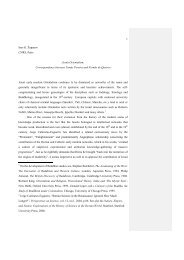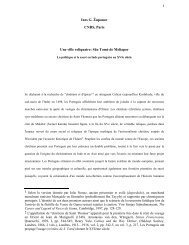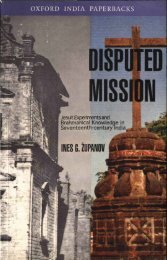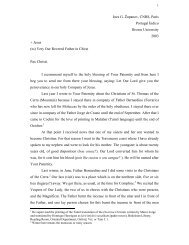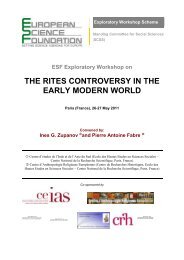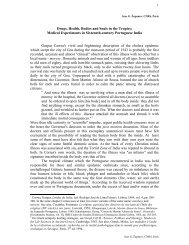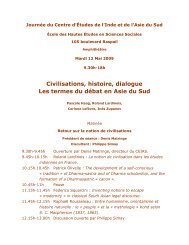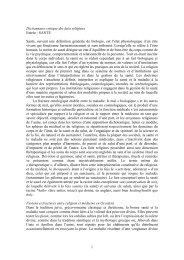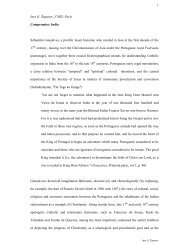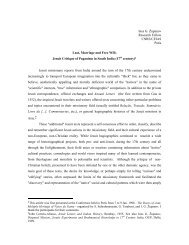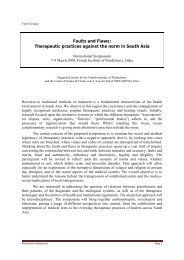Professional Missionary and Orientalist Curator ... - Ines G. Županov
Professional Missionary and Orientalist Curator ... - Ines G. Županov
Professional Missionary and Orientalist Curator ... - Ines G. Županov
Create successful ePaper yourself
Turn your PDF publications into a flip-book with our unique Google optimized e-Paper software.
215 <strong>Professional</strong> <strong>Missionary</strong> <strong>and</strong> <strong>Orientalist</strong> <strong>Curator</strong><br />
particular interested in underst<strong>and</strong>ing the origin <strong>and</strong> truth of Indian<br />
religious <strong>and</strong> philosophical ideas <strong>and</strong> he was sure that the Sanskrit<br />
<strong>and</strong> the ancient books were the keys to the enigma. His efforts were<br />
not always appreciated, especially by the British <strong>Orientalist</strong>s who denounced<br />
him as a fraud.<br />
Alex<strong>and</strong>er Hamilton thought that Paulinus’s Sanskrit dictionary,<br />
Amarasinha printed in 1798, was «a dictionary of the Malabar idiom,<br />
which bears the same relation to the Sanskrit that Italian does to<br />
Latin» 38 . It is clear today that the misunderst<strong>and</strong>ing came from the<br />
fact that Paulinus transcribed Sanskrit words from the Grantha script<br />
<strong>and</strong> under influence of the Dravidian phonology <strong>and</strong> into the Italian<br />
orthography. On the other h<strong>and</strong>s, the British Sanskritists in Calcutta<br />
learnt Sanskrit from their Bengali pundits. Paulinus was aware that<br />
the transcription <strong>and</strong> transliteration of Indian languages was a problem.<br />
«The Europeans, Arabs, Persians, Greeks who do not underst<strong>and</strong><br />
Indian language, try to pronounce or write Indian words with<br />
the same corruption as dictated by their spirit (genío) <strong>and</strong> secondly<br />
according to the pronunciation of their country (patria) which leads<br />
to another corruption that changes <strong>and</strong> transforms <strong>and</strong> corrupts in<br />
everything <strong>and</strong> in part the true native Indian name» 39 . He castigated<br />
in particular the French geographers such as Jean Baptiste Bourguignon<br />
d’Anville (1697-1782), Guillaume de l’Isle (1675-1726), Andrea<br />
Cellario <strong>and</strong> the French Capuchin François Marie de Tours (d.<br />
1709) for daring to write about India ignorant as they were of the<br />
correct spelling of the names. Paulinus, of course, was intended to<br />
correct all the names bastardized by the foreigners (stranieri) <strong>and</strong><br />
travelers (viaggiatori) <strong>and</strong> to st<strong>and</strong>ardize their pronunciation according<br />
to the Italian orthography. Thus, he claimed Corom<strong>and</strong>el should<br />
be spelled Ciòlam<strong>and</strong>ala.<br />
Taking up William Jones’s opinion that «[our] English alphabet <strong>and</strong><br />
orthography are disgracefully, <strong>and</strong> almost ridiculously, imperfect»,<br />
Paulinus added his own more devastating appraisal. «The English alphabet<br />
is not only imperfect but plainly ridiculous when it comes to<br />
expressing Indian nouns, they horribly corrupt them when writing<br />
them in that alphabet» 40 . But, of course, the way European Oriental-<br />
38<br />
Trautmann, Aryans <strong>and</strong> British India cit., p. 36; A. Hamilton, title?, in «Review<br />
of Asiatick Researches», VI, 1802, pp. 30-310.<br />
39<br />
Paulinus, Viaggio cit., p. 17.<br />
40<br />
W. Jones, A dissertation on the Orthography of Asiatick Words in Roman Letters by




